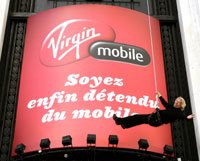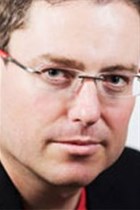
Top stories






More news


Marketing & Media
Ads are coming to AI. Does that really have to be such a bad thing?














It was a well-crafted marketing campaign with an unambiguous message: the new SA businesses — financial services firm Virgin Money and mobile virtual network operator Virgin Mobile — would be the champions of consumers.
Branson vowed to slay SA's “banking beast” and accused SA's big four banks of “ripping off consumers”. It was Captain Branson to the rescue.
Twenty-one months later and ugly reality has intervened. Loss-making Virgin Mobile has failed to attract anywhere near the number of subscribers it hoped for and Virgin Money is saddled with bad debts after the credit binge.
Both companies have cut staff numbers — Virgin Mobile from more than 400 to 250.
And both businesses have new leaders. Virgin Mobile, a 50-50 joint venture with network operator Cell C — it piggybacks on Cell C's network — has its third CEO in as many years.
Bailey was hired after the resignation of Peter Boyd, who had been at Virgin Mobile for two years. Boyd, now at Virgin International in the UK, was preceded by Sajeed Sacranie, who lasted just five months.
“We have gone through a substantial cost-cutting exercise,” Bailey says of the recent restructuring. “The new cost structure fits the business to our new focus.” That focus is the post-paid consumer market and the upper end of the prepaid market. “We tried to approach the market too broadly and compete in all segments of the market.” “[Virtual network operators] need to focus on specific segments of the market where they are better able to compete.”
Arthur Goldstuck, MD of research firm World Wide Worx, says Virgin Mobile relied too heavily on the Richard Branson and Virgin brands. “It's not proved as successful in SA as it might have been in other countries,” Goldstuck says. “His high-profile publicity stunts don't impress the SA public as much as a clear, cheap and solid up-front offering.”
He says Virgin Mobile also failed to communicate clearly why consumers should choose it over a telephone company that operates its own network. “The concept of a virtual operator wasn't successfully communicated by Virgin.”
Bailey says the company will turn a profit within 24 months, probably sooner. That's in spite of having only 200,000 customers — Vodacom and MTN have 26m and 17m respectively.
Hedberg, who chairs Virgin Mobile's board, says Bailey's appointment has already “injected significant and positive changes” into the company. “He has restructured the business and reinstated its focus on the post-paid market and there has been a strong increase in subscribers since the beginning of the year.”
Virgin Mobile claims to have increased its share of new post-paid customers to between 8% and 10% of the market. “We are very happy with that, given the relative size of our business and our limited marketing spend,” says Bailey.
An expanded distribution channel has helped the company in recent months. Retail partners are Woolworths, Spar and Shoprite/Checkers It also operates 25 Virgin Mobile-branded stores and has kiosks in 32 Musica stores.
Bailey says Virgin Mobile is punching well above its weight, despite operating in a regulatory environment that “does not favour new entrants”. He says high wholesale mobile interconnect tariffs — the fees operators charge one another to switch calls between their networks — protect large incumbent operators and disadvantage new entrants. This is because smaller players have most of their calls placed off-network to the bigger operators, incurring high fees.
The Independent Communications Authority of SA (Icasa) is expected to begin forcing down call-termination rates this year. Bailey says it can't come soon enough and would like, eventually, to see the rates at least halved.
The virtual network operator model, adds Bailey, is the best way of attracting new investment. He says it's unlikely a foreign investor would want to invest in a new mobile network because the market is already so mature. With the right regulatory conditions, virtual operators, piggybacking off other players' infrastructure, would do well, he says.
Asymmetric interconnect, where termination rates are deliberately skewed in favour of new entrants, would greatly assist in driving down prices and fostering significant competition, Bailey says. “[The regulator] needs to decide if it wants to continue to favour the incumbents, or stimulate the market.”
Goldstuck agrees. “The single biggest difference the regulator can make to millions of South Africans is to drop the interconnect fee by R1,” Goldstuck says.
This would help Virgin Mobile and encourage new virtual network operators to invest in the country, he adds.
The challenges at Virgin Money are altogether different. A joint venture between Virgin and Absa, the company has bad debts significantly above the average.
Virgin Mobile launched with a line of credit cards and last year expanded into providing home loans.
“We've had serious challenges,” says MD Vinay Padayachee “The market norm [for bad debt] was running around 9% of book and we were seeing 14% - 15%. We realised we were headed for a problem and had to be less aggressive on growth and restructure the business in line with costs.”
Head count was cut from 120 to 96 and the company reduced the size of its premises. More focus was placed on recovering debt. “We feel we have the impairments under control,” Padayachee says.
He says Virgin Money launched at the best possible time — SA was in the middle of an unprecedented consumer spending boom that lasted from 2002 to 2008. Demand for credit was soaring and Virgin Money signed up 100,000 credit card customers in its first few months of operation. Its call centre couldn't cope with the demand.
But then the hangover hit as the economy slowed, inflation rose and the property market slumped.
Padayachee says Virgin Money is “making money” but concedes it's nowhere near the amount forecast in the business plan. “The real challenge is around the impairments.”
The National Credit Act, introduced in June 2007 and designed to protect consumers from unscrupulous lending practices, has had little impact on Virgin Money. The economic slump has had much more effect, Padayachee says.
He says Virgin Money's credit card business is growing, but “not at levels we'd like to see”. It has about 120,000 active customers. A further 70,000 are in collections or have been handed over to lawyers.
Virgin Money, which launched with a multimillion-rand television advertising campaign, has cut marketing spend to the bone, with most activity taking place below the line. Two-thirds of its marketing spend is online. Padayachee says it's not the right time to advertise aggressively.
The home loans business, meanwhile, got off to a slow start but is growing. Launched last year, Virgin Money now has a R500m home loans book. “It launched in a tight economic cycle, so all it can do is go up,” Padayachee says.
New products are planned, including a core banking product — a transactional account where employers can deposit salaries. The company may launch vehicle and asset finance business, but that's not on the cards for 18 months at least.
Padayachee says Absa and Virgin remain committed to the venture. He says Branson — the Virgin boss is a regular visitor to SA and owns a luxury game farm and lodge in the Lowveld — has a special place in his heart for SA and remains fully committed to Virgin's businesses here.
His other big business in SA, Virgin Active, is performing well and is opening health clubs across the country.
He may not have slain the country's banking and cellphone beasts, but Branson appears unlikely to give up on his two newest SA babies, despite their growing pains.
Source: Financial Mail
Published courtesy of
